'Synchronic' Review: A time-travelling trip that misses its destination [TIFF 2019]
Certain pairs have reshaped the entire film industry, and I’m not just referring to iconic duos on screen. This goes further than professional chemistry such Bogart & Bacall, or friendship such Affleck & Damon, or even a working relationship such as Depp & Burton, occasionally, in the rarest of instances, it can be all of those aspects combined.
Aaron Moorhead & Justin Benson might not be household names, but something is on the horizon for this duo. They have been friends for years, they have worked together, they have acted together, but the most important thing about them is that they have created together.
Directing Duo Aaron Moorhead & Justin Benson
What they are on the verge of creating, is perhaps their own sub-genre of film. Their own style. Their own feel. To put it succinctly, their own ‘thing’. That is almost accomplishing the impossible in a world where cinema is dying because Cinema’s brothers, Creativity and Originality, are all but dead.
SYNCHRONIC follows two Paramedics (Anthony Mackie & Jamie Dornan) who, after discovering a series of grisly and bizarre deaths linked to the newest party drug (the aptly named Synchronic) discover that this drug can transport you through time. Granted, you may have to go back and reread that description, but I assure you, it is the best way to describe it. It is impossible to describe the entire journey of this film in just one sentence, and that has been the case for their entire filmography.
What I enjoy about the films of Moorhead & Benson is that they take the familiar, and then take it in several different directions. They are two of the best genre-twisters making films today. I have always enjoyed seeing how a movie-site like IMDB tried and defines films. I don’t envy the person who has to write the page for any of this duo’s films, because to describe what genres they use in three or less monosyllabic fashion is impossible. The flip side to that, is that elements from many of their films can seem all-too-familiar. Many pieces of the puzzle that is SYNCHRONIC felt like pieces you have used in a different puzzle; as if they were lost at one point and thrown into a different box. Mackie has a sequence where he learns how to harness the power of Synchronic in front of a video camera; speaking directly to the audience in exposition-heavy science-fiction jargon as he reveals ‘the rules’ of how time travel works.
Granted, you can make a picture using all those random puzzle pieces, but you quickly notice the pieces lack coherency. As mentioned, taking their story and their film in several different directions is part of what defines the style of Moorhead & Benson, but I found SYNCHRONIC to be meandering. After the screening, I felt as if I had watched at least three different films. The first act was a Fincheresque enigma; a dimly lit neo-noir where the two partners discover these supernatural medical mysteries. Part of the second act had soul-shaking nightmare imagery as if David Lynch took over the direction of the film. The latter half of the second act was more akin to a Marvel film, where our plucky hero learns to control his powers.
In the end, and I do mean the literal conclusion of this story, I was left disappointed. There are some great moments of connection between the two protagonists, which is a reflection of the directing-duo’s close friendship. The two actor/directors even played brothers in The Endless, so something tells me Mackie and Dornan might reflect a piece of that relationship. While the two characters bond during the film, they of course open up, and what I really liked was some of Mackie’s character, Steve’s observations on the world. There is an underlying theme of ‘living in the moment’ and appreciating the world you live in today. That subtext becomes literal text when the character travels through time to reveal some dark moments in humanity’s past, but the message is clear.
But when they were given a chance to conclude the story in a much more poignant and effective manner, they took the easy way out. It was an unfortunate example of a ‘Hollywood ending’; safe, predictable and in my opinion out of line with the aforementioned theme. This choice was disappointing for a few reasons, not the least of which is these two filmmakers are not ‘Hollywood’. They do their own thing quite often, so the ending felt uninspired.
SYNCHRONIC is a film better suited for a shorter format. In today’s entertainment landscape, ideas like this would do well in the Twilight Zone reboot or the seminal series Black Mirror. SYNCHRONIC did have subtext, it did have a message, it did have a central idea, but because Moorhead & Benson wanted to introduce so many elements from different genres, almost all of that effective storytelling was, ironically… lost in time.



